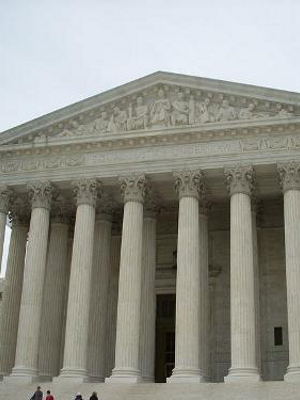An increasing number of voices are now calling for judicial term limits. Indeed, judges in all major nations and almost all 50 states are subject to age or term limits. The current Court is young, ideological, and activist. Liberals are worried that the right-wing propensity of five justices and their lifelong tenure will mean a decades-long assault on the power of Congress. The Court’s conservatives average only 66 years of age, meaning they should rule for well over a decade.
As well, there have been renewed calls for oversight of recusal standards of Supreme Court justices who at present are left to their own discretion as to when an apparent conflict of interest demands that they step down from ruling on a given case. Numerous instances have arisen on the present Court where Justices ruled despite the perception of partiality. When called upon to recuse himself from ruling in Bush v. Gore due to apparent conflicts, Justice Scalia joked that his vote could not be bought that cheaply. Recusal standards are about public trust, and so concern perceived conflicts as well as actual conflicts. Scalia’s sons worked in the law firms representing Bush. Recall that Scalia was the most vocal member of the five-justice majority that handed Bush the presidency and Scalia’s hunting buddy Cheney the vice-presidency. And Justice Thomas also refused to recuse himself and voted in the narrow majority, despite his wife working for the Heritage Foundation, which was working with the Bush team. Oversight and accountability on judicial ethics standards is indispensible to the Court’s credibility.
Duke University law professor Paul Carrington wrote in his April 9 New York Times op-ed “Bring the Justices Back to Earth”: “The power to invalidate legislation is, in a sense, the ultimate political power, and mortals who exercise it need constraint. So why not the highest court in the land?” Carrington suggests that if the Court overturns the Affordable Care Act, broadly prohibiting the government from providing accessible healthcare, then Congress should use its constitutional power to define the number and role of the justices to add two more justices and impose limits on the tenure of all justices. But the former proposal would constitute unaccepted court-packing, and the latter would require a constitutional amendment of Article III’s lifetime tenure provision.
America’s broken inequitable, indecent healthcare system burdens the nation in many ways. Blogging from oral argument (“Obamacare Supreme Court case is a bad joke,” The New Yorker, March 27), economics writer John Cassidy says: “the whole thing is absurd – yet another example of how America’s antiquated system of government, and its determined refusal to accept the economic realities of the modern world, is undermining its future.”
American exceptionalism has taken a strange turn. Liberty, justice, prosperity, and social mobility are being replaced by guns, the return of the gilded age, the anomaly of the death penalty, and a lack of universal healthcare. From the European perspective it shocks the conscience that a wealthy nation would allow its people to go without basic medical care. Hypocrisy marks America’s healthcare debate as those who chide that Obamacare is socialism and takes away individual freedom are themselves mainly beneficiaries of the quality healthcare that they say is bad for the rest of us.
Some 50 million Americans were uninsured in 2011, using some $43 billion of healthcare services they cannot pay for. As the U.S. Solicitor General told the Court, this cost is transferred to other American families with a price tag of about $1,000 per year, such that the individual mandate is within Congress’s power “not only because it is a necessary component of a broader scheme of interstate commerce [but also because it regulates] the way in which individuals finance their participation in the health care market.” The advocate for those challenging the Act called it “a revolution in the relationship between the central government and the governed.”
Parallel universes are evident once again, but to speak the language of the critics, America was founded on revolution and it may be time to appeal to that history in our healthcare debate. As we better understand the human mind, we learn that logic as a process of reasoned inquiry is a most elusive ideal; humans tend to absorb only that evidence which confirms their beliefs – evidence we don’t like be damned! This suggests that values should be at the forefront of debate, so as to give the facts a fighting chance. Universal healthcare can be made a cause of Tea Party-like patriotic fervor. Conventional wisdom holds that a public option or single-payer system like Britain or Canada is DOA in the USA. The success of America’s right-wing, values-driven political agenda is instructive in how to defy such conventional wisdom. Sick of being sick? Speak up.
Will the Court strike down the signature achievement of President Obama? The law of unintended consequences may come into play, for if they do, the backlash may be great. Universal healthcare coverage is an obvious need – in terms of efficiency, competitiveness, and decency. If America’s legislative patchwork for universal care is struck down by the Court, then a public option toward universal healthcare may be the ultimate outcome.
About the author:
The author, a constitutional law scholar, member of the California Bar and TNP contributing writer, lectures on law, ethics and critical thinking in the undergraduate and graduate programs at the University of New York in Prague
published: 27. 5. 2012







